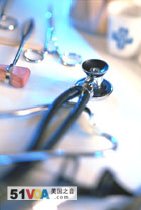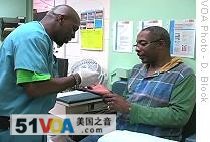Washington
27 April 2009
 |
"Not having the insurance, I wasn't [inclined] to going into a doctor's office, creating a bill for a physical," he said.
But a few years ago, he was diagnosed with diabetes. The 52 year-old now has to give himself shots of insulin that are so expensive that he cannot always afford the required dose.
I'm not really doing myself real justice, but you figure a little bit part of the dosage is better than no dosage. Sometimes you may even skip a day just to keep some insulin on hand," he said.
The U.S. government helps pay for the health care of people who are extremely poor, or over the age of 65. But the majority of Americans are not covered by those programs. They must purchase private insurance, which is usually very expensive, or buy discounted coverage through their employer.
The problem is that Chambers can only find part-time jobs and is often out of work. The unstable income puts him in a "gray area." He said he generally makes too much money to get government health coverage, but too little money to pay for private insurance.
![[insert caption here] [insert caption here]](https://img.51voa.cn/images/200904/photoscom_doctor_elderly_patient_210.jpg)
The group said these people could be at risk of serious illness and even premature death.
It means when the onset of disease or pain is felt, mostly uninsured people delay going to a doctor "And in some instances, the problem goes away. But in other instances, the disease may spread and unfortunately [in] too many situations, people pay the ultimate price."

Community health centers partly funded by the government offer some relief in areas that have them. Chambers gets his treatments from one of these centers, a Washington-based group called Community of Hope.
The clinic is tucked into the basement of an elementary school in a culturally mixed neighborhood dotted with Ethiopian and Hispanic restaurants.
The lobby is full of people seeking help for toothaches, high cholesterol and AIDS. They pay only what they can afford.
Community of Hope's executive director, Kelly Sweeny McShane, said the clinic has always been busy, but demand has soared since the economic crisis hit last year. She says the clinic cannot take everyone looking for help.
"We have about at least 30 patients on a waiting list to become new patients,?she said. "And part of what we're just trying to manage is so many patients coming in - how do we fit them into a schedule."
Middle class Americans who have lost their jobs are among them.
Sweeny McShane said Community of Hope's doctors and nurses are extremely dedicated to helping their patients. But problems arise when the uninsured need help beyond their clinic.
"The medications, the pharmacy, the specialist care is often very difficult to find," she said.
Doctors advise preventive care is the best way to avoid more costly treatments in the future.
Robert Chambers agrees. He said he learned that the hard way by ignoring his diabetes. Despite that, he still feels lucky. He recently married and is now insured through his wife's employer.
"That was one of the benefits of the wedding," he said, laughing.
But the fear of being uninsured remains, and Chambers said he is still waiting for the day when affordable health care is a basic right.